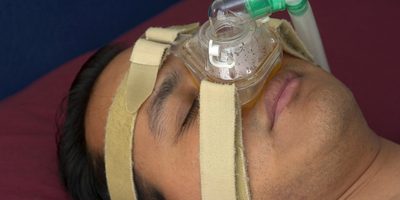
Sleep apnea trial a step closer to answering a life-saving question
The Sleep Apnea and CardioVascular Endpoints (SAVE) Study, the largest trial of its kind, has reached a critical milestone recruiting its 2000th participant, with only 500 more participants needed to complete the study.
This Australian led study is the largest continuous positive airway pressure (CPAP) trial ever conducted, and is the first randomized controlled trial designed to answer a life-saving question: Does treating obstructive sleep apnea with CPAP in patients with cardiovascular disease reduce the risk of cardiovascular events such as heart attack and stroke?
With heart attack and stroke being the first and third global causes of premature death and disability, the need to prevent and treat cardiovascular disease is a high priority for health policy and healthcare in the 21st Century.
By answering this important question, the SAVE study has the potential to change the way cardiovascular disease is treated in the future and to impact generations to come.
Obstructive Sleep Apnea is a condition in which a person stops breathing for several seconds at a time, many times over, during sleep due to relaxation of their throat muscles. This condition is very common and may cause sleepiness and poor concentration during the day.
About 10 per cent of middle-aged men and four per cent of middle-aged women have sleep apnea, causing them to wake up at least 15 times or more an hour. There is an increasing body of evidence to support a strong association between obstructive sleep apnea and cardiovascular risk factors such as high blood pressure, with some studies reporting thatthere is a two to four times greater risk of heart attack or stroke in people with obstructive sleep apnea.
CPAP was discovered at the University of Sydney in 1980 and is one of the current treatments available for obstructive sleep apnea and it involves the use of a small mask over the nose and/or mouth, which people wear whilst they sleep. The mask is attached via a hose to a small machine, which gently pushes air into the lungs and allows people to continue breathing normally.
CPAP has been shown to effectively reduce snoring, obstructive episodes and daytime sleepiness. Some short-term research studies have shown that CPAP may also help to reduce blood pressure. The SAVE study is the first study to test if using CPAP prevents future heart attacks and strokes.
This international research study led in Australia by researchers from the Adelaide Institute for Sleep Health at Repatriation General Hospital (Flinders University) and The George Institute for Global Health in Sydney is currently recruiting patients in Australia, New Zealand, China, India, Brazil, Spain and the USA.
More participants needed
SAVE study participants, who are between 45-75 years and have a pre-existing cardiovascular disease, are invited to participate in this study. Participants are randomly allocated to either a CPAP treatment group or a group which continues to receive their usual medical care. Both treatment methods will be compared to determine their effectiveness. People who have used CPAP previously are not able to participate.
- For more information visit the SAVE trial website
- Click here for more information on participating in Australian clinical trials
For Australians interested in participating in this research please call 1800 397 371 for more information.


